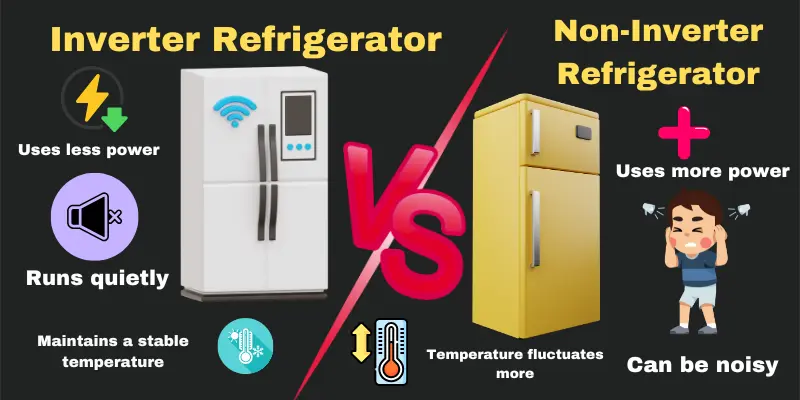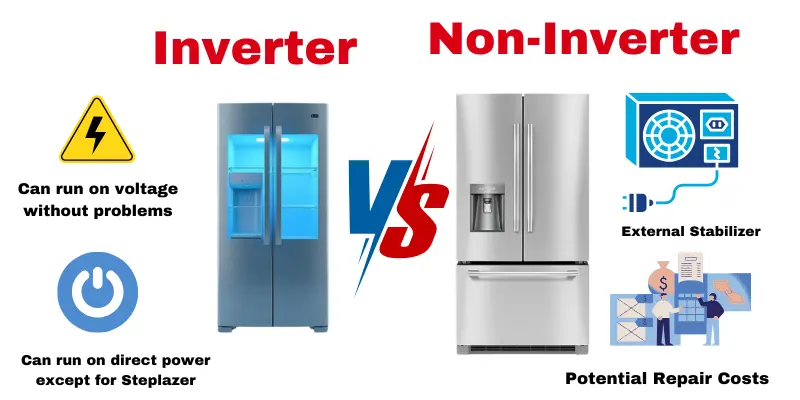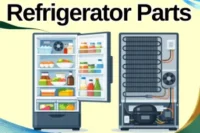Inverter vs Non-Inverter Refrigerators: Which Is Better?
Published: 1 Oct 2025
Have you ever wondered why some refrigerators claim to save more electricity than others? The answer lies in the type of compressor they use. So, what is the difference between an inverter and a non-inverter refrigerator? One adjusts its speed for better efficiency, while the other runs at a fixed pace. But which one suits your needs?
Let’s know everything in detail. Are you ready?
What Is an Inverter Refrigerator?
An inverter refrigerator is a fridge that saves electricity by changing its cooling speed based on need. Instead of turning on and off like a regular fridge, it runs continuously but at different speeds. This helps keep the temperature steady, reduces noise, and makes the fridge last longer. Many people choose inverter refrigerators because they use less power and work more smoothly.
Now that we know what an inverter refrigerator is, let’s see how a non-inverter refrigerator works. In the next section, we’ll explain its features and how it is different.
What Is a Non-Inverter Refrigerator?
A non-inverter refrigerator is a fridge that runs at a fixed speed. It turns on when cooling is needed and turns off when the temperature is right. This start-stop process uses more electricity and can make the fridge noisier. While non-inverter refrigerators cost less to buy, they may lead to higher electricity bills over time.
Now that we have learned about non-inverter refrigerators, too, it’s time to compare them. In the next section, we will see the key differences between these two types.
Comparison of Inverter vs. Non-Inverter Refrigerators
Now that we’ve explored inverter and non-inverter refrigerators separately, it’s time to compare them in more detail. By breaking down their differences, we’ll help you decide which one suits your needs best.

Here’s a quick table to give you a snapshot of the differences:
Comparison Table:
| Feature | Inverter Refrigerator | Non-Inverter Refrigerator |
| Energy Efficiency | Uses less power by adjusting speed | Uses more power due to frequent on/off |
| Cooling Performance | Maintains a stable temperature | Temperature fluctuates more |
| Noise Levels | Runs quietly | Can be noisy |
| Lifespan | Lasts longer due to smooth operation | Wears out faster due to sudden starts |
| Cost | Higher upfront cost | Lower initial cost |
| Voltage Handling | Handles fluctuations better | May need a stabilizer |
Now, let’s discuss each of these features one by one!
Energy Efficiency
Inverter refrigerators are more energy-efficient compared to non-inverter models.
- Inverter Refrigerator:
- Adjusts compressor speed based on cooling needs, using less electricity.
- Reduces energy waste by running continuously at varying speeds.
- Saves on long-term energy costs.
- Better for environmentally conscious users.
- Non-Inverter Refrigerator:
- Works at a constant speed, turning on and off, using more power each time it starts.
- Higher electricity bills over time due to constant start-stop cycles.
- Less energy-efficient, especially for long-term use.
- It might not be ideal for large households with heavy usage.
Cooling Performance
The cooling performance varies between the two types.
- Inverter Refrigerator:
- Maintains a stable internal temperature, keeping food fresh for longer.
- It is ideal for storing items that require consistent cooling.
- Handles temperature changes better when the fridge is frequently opened.
- Reduces the chances of food spoilage due to uneven cooling.
- Non-Inverter Refrigerator:
- The temperature fluctuates because the compressor turns on and off.
- This can lead to uneven cooling, affecting food freshness.
- May cause some food to freeze or spoil more quickly.
- Not ideal for sensitive items like dairy or fruits.
Noise Levels
The noise produced by each type is quite different.

- Inverter Refrigerator:
- Quieter operation due to the smooth and continuous running of the compressor.
- Ideal for quiet environments like bedrooms or small apartments.
- Less intrusive in open-plan living spaces.
- Produces little to no noise when running at low speeds.
- Non-Inverter Refrigerator:
- Noisier because the compressor starts and stops abruptly.
- It can be distracting, especially in open kitchens or quiet spaces.
- Higher noise levels when the compressor starts up.
- Not ideal for homes where peace and quiet are a priority.
Lifespan
The lifespan of these two types can vary greatly.
- Inverter Refrigerator:
- Lasts longer due to smoother operation and less wear on the compressor.
- Fewer mechanical issues as it avoids constant start-stop cycles.
- It can serve you for 10-15 years or more with proper care.
- Less likely to need expensive repairs in the long run.
- Non-Inverter Refrigerator:
- Shorter lifespan because of the frequent strain caused by constant cycling.
- More wear and tear on the compressor, leading to quicker breakdowns.
- It may need repairs sooner, especially after a few years of use.
- Typically lasts around 5-8 years before major issues arise.
Cost
The upfront cost is another important consideration.
- Inverter Refrigerator:
- Higher initial cost due to advanced technology.
- It can save money on energy bills over the long term, making it a good investment.
- Better for those looking for long-term savings.
- Worth considering if you plan to keep the refrigerator for many years.
- Non-Inverter Refrigerator:
- Lower upfront cost, making it budget-friendly.
- Higher running costs due to increased power consumption.
- More affordable for those on a tight budget.
- It could end up costing more in electricity over time.
Voltage Handling
How each type handles voltage fluctuations can be important, especially in areas with unstable power.
- Inverter Refrigerator:
- Better at handling voltage fluctuations and power surges.
- Often doesn’t need an extra stabilizer, making it more reliable.
- Can run on a wider range of voltages without issues.
- More suitable for areas with an unstable power supply.
- Non-Inverter Refrigerator:
- May require an external stabilizer to protect from power surges.
- It can get damaged by sudden voltage changes, leading to potential repair costs.
- Not designed to cope with power spikes as well as inverter models.
- Stabilizer costs can add up over time, making it less cost-effective.

Now that we’ve compared the key features of both inverter and non-inverter refrigerators, it’s time to think about which one best fits your needs. Let’s look into the factors you should consider when making your choice.
Which One Should You Choose?
Choosing between an inverter and a non-inverter refrigerator depends on your needs, budget, and preferences. Here are some things to consider:
- Go for an Inverter Refrigerator if:
- You want energy savings in the long term.
- You need a quieter fridge for a peaceful home.
- You’re willing to invest a little more up front for lower running costs.
- You need consistent cooling for sensitive food items.
- Go for a Non-Inverter Refrigerator if:
- You have a smaller budget and need a cheaper option.
- You don’t mind higher electricity bills.
- You don’t mind a bit of noise from your fridge.
- You’re not concerned about long-term energy savings and maintenance costs.
This decision ultimately comes down to your specific needs and how much you’re willing to invest upfront versus saving over time!
If you still have any questions or doubts, don’t worry! We’ve prepared a section with frequently asked questions to help clear things up.
Questions and Answers about Inverter and Non-Inverter Fridge
When choosing between an inverter and a non-inverter refrigerator, many common questions may come to mind. Don’t worry; we’ve answered the most frequently asked questions to help you make a clearer decision. Here are some of the questions you might have:
Here are a few common questions people have when comparing these refrigerators:
- Which refrigerator type is better for large families?
- Can non-inverter refrigerators cool the fridge faster than inverter ones?
- Is there a significant difference in the lifespan of inverter and non-inverter refrigerators?
- Do inverter refrigerators require more maintenance than non-inverter ones?
- Which type of refrigerator is quieter in terms of operation?
- How does the cost of running an inverter fridge compare to a non-inverter fridge over time?
- Which refrigerator is better for the environment?
- Can I store perishable food in both types of refrigerators?
Now we discuss the answer to each question in detail.
Inverter refrigerators are a better choice for large families. They offer more consistent cooling, which helps keep large amounts of food fresh for longer periods. Since families with many members often store a large quantity of groceries, steady temperature control is very useful. These refrigerators also handle frequent door openings better, making them ideal for heavy daily use.
Yes, non-inverter refrigerators may cool a bit faster at the beginning because they run at full power when first switched on. However, their cooling is not very consistent and can create uneven temperatures inside. This can affect how long food stays fresh. In contrast, inverter refrigerators adjust power smoothly, so they cool evenly and maintain steady temperatures over time.
Yes, there is usually a clear difference in lifespan. Inverter refrigerators last longer because their compressor runs smoothly at different speeds instead of constantly starting and stopping. This gentle operation reduces strain on the parts, preventing early wear and tear. Non-inverter fridges often face more stress from frequent on-and-off cycles, which can shorten their overall life.
No, inverter refrigerators generally need less maintenance. Their stable operation puts less pressure on the compressor and other parts, so they break down less often. Non-inverter models, on the other hand, may require more repairs over time because of frequent starting and stopping. This makes inverter refrigerators more reliable in the long run.
Inverter refrigerators are usually quieter. They run continuously but at different speeds, which reduces noise. Non-inverter refrigerators can be louder because the compressor makes a noticeable sound every time it starts or stops. For households where quiet operation matters, inverter models are the better choice.
Inverter refrigerators are more economical to run over the years. They use less energy by adjusting cooling levels according to need, which keeps electricity bills lower. Non-inverter refrigerators often use more power because of their frequent on/off compressor cycles. While inverter models may cost more at first, they save money in the long run through energy efficiency.
Inverter refrigerators are better for the environment. They consume less electricity, which helps reduce energy waste and lowers carbon emissions. Non-inverter fridges, on the other hand, use more power, making them less eco-friendly. Choosing an inverter model not only saves money but also supports greener living.
Yes, you can store perishable food in both inverter and non-inverter refrigerators. However, inverter models are better at keeping food fresh because they maintain a steady and consistent temperature. Non-inverter fridges may have slight temperature ups and downs, which can cause some foods to spoil more quickly. For longer freshness and safer storage, inverter refrigerators are the smarter choice.
Now that we’ve answered some of the common questions, we’ve learned a lot about both types. Let’s move forward to the final conclusion of this article!
Conclusion
So, guys, it’s time to say goodbye.
In this article, we’ve covered What is the difference between an inverter and a non-inverter refrigerator? in detail. After comparing both types, I recommend going for an inverter refrigerator if you want long-term energy savings, less noise, and better overall efficiency. However, if you’re on a budget and don’t mind a little extra noise and higher electricity bills, a non-inverter fridge might be a better fit. Let me know in the comments which fridge you’d choose and feel free to check out more helpful articles on fridge tips!





